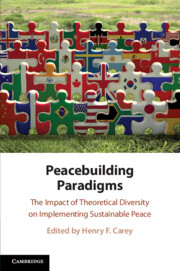Book contents
- Peacebuilding Paradigms
- Peacebuilding Paradigms
- Copyright page
- Contents
- Figures
- Tables
- Contributors
- Foreword
- Introduction Bridging the Conceptual and Theoretical Divides on Peace and Peacebuilding
- Part I The Realist Paradigm
- Part II The Liberal Paradigm
- Part III The Constructivist Paradigm
- Part IV The Cosmopolitan Paradigm
- Part V The Critical Theory Paradigm
- Part VI The Locality Paradigm
- Part VII The Policy Paradigm
- 17 Peacebuilding Paradigm from the Perspective of Policy Approach
- 18 A Bottom-Up View at Peacebuilding
- Conclusion A Hybrid Approach to Understanding Peacebuilding
- Bibliography
- Index
18 - A Bottom-Up View at Peacebuilding
Pragmatism, Public Opinion, and the Individual as Unit of Analysis in Postconflict Societies
from Part VII - The Policy Paradigm
Published online by Cambridge University Press: 16 December 2020
- Peacebuilding Paradigms
- Peacebuilding Paradigms
- Copyright page
- Contents
- Figures
- Tables
- Contributors
- Foreword
- Introduction Bridging the Conceptual and Theoretical Divides on Peace and Peacebuilding
- Part I The Realist Paradigm
- Part II The Liberal Paradigm
- Part III The Constructivist Paradigm
- Part IV The Cosmopolitan Paradigm
- Part V The Critical Theory Paradigm
- Part VI The Locality Paradigm
- Part VII The Policy Paradigm
- 17 Peacebuilding Paradigm from the Perspective of Policy Approach
- 18 A Bottom-Up View at Peacebuilding
- Conclusion A Hybrid Approach to Understanding Peacebuilding
- Bibliography
- Index
Summary
This chapter argues that the increased focus on pragmatic peacebuilding might represent a paradigm shift, a new way we view, conceptualize, and conduct peacebuilding. However, the very inductive nature of pragmatic peacebuilding would make indispensable its exchange with other paradigms, which would have an opportunity to learn from pragmatic trial-and-error practices and employ thus created knowledge in their peacebuilding processes and conceptualization. Therefore, pragmatic peacebuilding finds itself in the unique position of being both a distinct paradigm and a source of knowledge for other peacebuilding paradigms.This chapter continues with an ontologically focused review of the major peacebuilding paradigms. The second section outlines the pragmatic peacebuilding framework as well as its limitations. The third section discusses pragmatic peacebuilding as a paradigm shift. The fourth section tries to frame public opinion in postconflict societies as a pragmatic peacebuilding tool and highlights the need to expand and sharpen its application.
- Type
- Chapter
- Information
- Peacebuilding ParadigmsThe Impact of Theoretical Diversity on Implementing Sustainable Peace, pp. 304 - 323Publisher: Cambridge University PressPrint publication year: 2020



